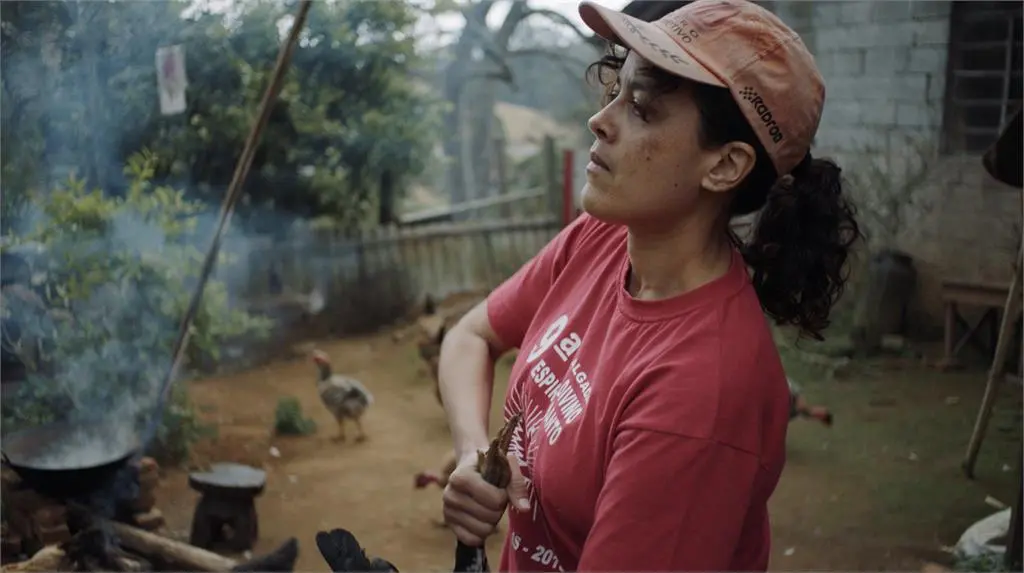Carolina Markowicz is a screenwriter and director based in São Paulo, Brazil. Her short films have won many international awards and have played in more than 200 festivals worldwide including TIFF, SXSW and Cannes’ Directors’ Fortnight, where she received the Queer Palm for “The Orphan.”
“Charcoal” is screening at the 2022 Toronto International Film Festival, which is running from September 8-18.
W&H: Describe the film for us in your own words.
CM: “Charcoal” is a satire about values, society’s hypocrisy, and how we became immune to absurdity. It’s about finding an excuse for whatever you wish to do and how religion and politics can profit from this.
W&H: What drew you to this story?
CM: I grew up in the countryside, so that environment was very natural for me. There, I experienced everything a small conservative city could offer you: people taking care of each other, families united by the fact that “family must stick together,” and marriages where couples almost hated each other — but as it is shameful to be single, let’s keep the status quo! And of course, you can be a murderer, but please don’t be gay.
I’ve always been interested in trying to investigate this dynamic, and I think Brazil’s political situation nowadays is totally related to those values.
W&H: What do you want people to think about after they watch the film?
CM: I want them to be a bit disturbed. And to think about how violence has been so sneaky in taking over our lives. I also hope they fall in love with Jean, [our nine-year-old protagonist], as much as I did.
W&H: What was the biggest challenge in making the film?
CM: “Charcoal” was one of the first projects shot right after the pandemic which allowed us to come back to set, so it was pretty challenging in all senses, including budget wise, since part of it went to Covid measures. But I guess the biggest artistic challenge was creating, alongside with the cast, the specific, weird tone we wanted to achieve.
W&H: How did you get your film funded? Share some insights into how you got the film made.
CM: Many ways. The film has been raising money for a long time. We have Ancine (Brazilian film agency) funds and SPCINE funds (São Paulo film commission). It’s a coproduction with Argentina so we have funds from there as well. We also have Brazilian players Telecine and Canal Brazil. We have Ibermedia, and sponsors like Projeto Paradiso. It took over five years for the film to be funded.
W&H: What inspired you to become a filmmaker?
CM: Telling stories that I wanted to understand deeply.
W&H: What’s the best and worst advice you’ve received?
CM: The best: If it feels wrong, it is wrong.
The worst: It’s still spring in Toronto! You won’t need warm jackets!
W&H: What advice do you have for other women directors?
CM: To any filmmaker, it would be to stick to your artistic instinct. Believe in what you initially thought, but be aware that the film itself, the location, the actors, and the truth of the moment may bring you better things than what you had imagined before. Be attentive.
W&H: Name your favorite woman-directed film and why.
CM: Difficult to name just one, but one of my favorites is Agnès Varda’s “Le Bonheur.” It’s impressive the way she makes sun-kissed sunflowers feel corrosive. I love this incoherence.
W&H: What, if any, responsibilities do you think storytellers have to confront the tumult in the world, from the pandemic to the loss of abortion rights and systemic violence?
CM: A lot. We have to try to remind everyone, including ourselves, that the absurd is absurd! We are getting too used to the bizarre.
W&H: The film industry has a long history of underrepresenting people of color on screen and behind the scenes and reinforcing — and creating — negative stereotypes. What actions do you think need to be taken to make Hollywood and/or the doc world more inclusive?
CM: Main roles for people of color that are created, written, directed and produced by people of color in the main roles as well. I guess this logic works for all underrepresented communities.







